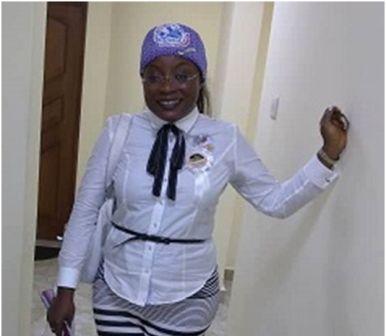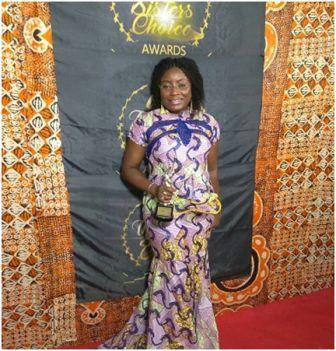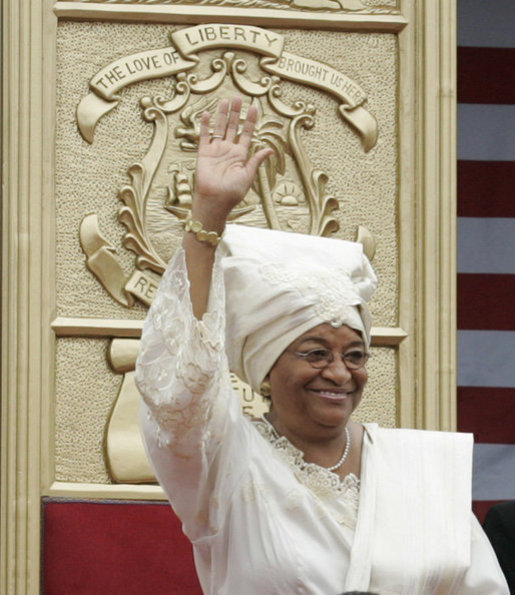S’Leone Ambassador Barnett promotes female quantitative & qualitative representation
Ambassador Dr. Marie Jilo Barnett prior to the General Elections in Liberia and in pursuance of peace in the sub-region at various conferences held in Monrovia/Liberia, in her capacity as guest speaker lectured on peace building and touched on salient issues within the Mano River Basin with regards female representation in decision making positions. (Photo: Ambassador Barnett delivering her statement)
H.E. Barnett who doubles as Sierra Leone’s Head of Mission in two troubled countries was again faced with challenges with regards elections and security. A month before Liberia’s electoral process, Ambassador Barnett has been in constant touch with stakeholders, security sectors and colleague Ambassadors as requested. Ambassador Barnett as Head Of Mission in these two countries (Liberia and Ivory Coast) before the Liberia elections at various Sierra Leonean settlements admonished them to be peaceful and law abiding and encouraged them to help promote the hard won peace in the two sister countries (Sierra Leone and Liberia). Ambassador Barnett among other members of the diplomatic corps and African Union Elections Monitors and Observers visited numerous election precincts in Montserrado County whilst other delegates including the Sierra Leone Embassy staff travelled to different counties where elections were said to be free and fair.
Below are statements delivered by Ambassador Barnett during the West African Women’s Policy Forum and the National Peace Building Conferences.
KEY NOTE ADDRESS BY H.E BARNETT AT THE ANNUAL WEST AFRICA WOMEN’S POLICY FORUM:
l am humbly honored, thankful and delighted for this opportunity extended to me by the organizers of this event to be a keynote speaker at this August gathering. As a wife, Mother, Grandmother, Theologian, Diplomat, Politician, Educationist, Women’s Advocate and a Civil Society Activist, the holding of this event in Liberia is very timely. As a theologian, let me draw our attention to the creation story according to (Genesis 1:26-27/2:21-24). A careful analysis of this story reveals that Eve was not made out of Adam’s head to top him, nor out of his feet to be trampled upon, or to be his slave, but from his side to be his equal partner. The one billion dollars question is how come women have regressed to the level of being dominated in this partnership? To answer this question, we have an opportunity to show case who we are as women and to be in solidarity with one another. We must however,
Firstly evaluate ourselves in terms of our successes and failures since the inception of this organization.
Secondly ask the question – Are we making progress in this Sub-Region, or are we regressing as shown by statistics?
Thirdly, Liberia is at the cross roads. African Women’s gain is being put to the test. Are the women of Liberia adequately prepared for the task at hand? If we cannot adequately answer the last question then I will ask: – What is wrong with women? How can we make things right? Let us look at the Diagnosis of our Sub-Region’s inhibiting factors and qualify them by categories.
Cultural/Traditional and Religious Norms – We the women have accepted the dictates of Culture/Tradition and Religion that keeps us at the bottom.
Distinct dichotomy between the male and female societies The male societies are a breeding ground for politics, job allocations, major decisions; while the women’s societies are a training ground for women to serve men, take care of the children etc.
Lack of Adequate Education – This is the biggest problem in our Sub-Region. Some of us educated women have made this decisive apartheid system (Us and Them)
EARLY Marriage – Young girls 13yrs are forced to marry old men for the economic sustenance of the family.
Lack of education strips the girl child of Equal Opportunities –
C. Women have an identity problem –
Example: Someone’s Wife, Somebody’s Mother, Someone’s Sister, Someone’s Daughter, and Someone’s Aunty.
Women in Politics – Except for Rwanda, there are few women parliamentarians in West Africa, Africa has only one woman President, even the gains made in the early 20th century is dwindling. Except we continuously advocate for Proportional Representation instead of constituency representation there will be le ss and lesser women in parliament. African Politics unfortunately is still dominated by violence and intimidation.
Women do not support women – an example: – The church. This infectious decease is like cancer that eats the very fabric of our humanity in this Sub-Region.
Our presence here today, around the theme: “Win with Women: Best Practices in Promoting Women’s Quantitative and Qualitative Representation in Decision Making” is a call for our common resolve to women’s emancipation.
This important forum, should enable us to ponder over, and diligently deliberate on the future course of action in improving upon women’s absolute presence in governance and logically, in the realm of decision making. While we do that, we must at the same time, look back through the decades for guidance, hope and courage from women models of excellence, whose faith in themselves, ardent resolve, and moral convictions have brought us this far.
The pioneering efforts of towering figures like Nightingale, Pankhurst, Lady Astor, Indira Ghandi, Sonia Ghandi, Eva Peron, and on our very own beloved continent Winnie Mandela, Marian Makeba, Gracia Marchel, Gertrude Mongela, Wangari Mathaai, Ngozi-Iweala, our own Madam Ellen Johnson Sirleaf of West Africa, among others, have bequeathed to us a solid basis upon which we are called to widen our horizons for the achievement of greater rewards.
The greatest service to ourselves and posterity, and a befitting tribute to the struggles of these great women named above, rest with our resolve to carry forward their heroic and noble work. That work entails neither challenge nor competition with the opposite sex, but to fairly register, freely express, and forthrightly seek for the attainment of our inalienable rights in all spheres of life. We will do so with unity, selflessness, prudence and patience guiding our footsteps, the high impediments and the thick mist of injustice will ultimately disappear.
I must express here my personal gratitude and appreciation for the inception of this forum and exceedingly welcome the focus of its fourth session on governance and decision making, as it is this all important domain, more than any other, that seems to pose a grave challenge to the advancement of women in Africa and particularly women in our Sub-Region.
Paradoxically, as identified by the information in our possession and as evidenced by statistics, West Africa, so close to the West in geographical terms than other parts of Africa and having had contacts with Western civilization and culture far longer is, unfortunately, a region where women’s presence in decision making is still negligible. I hope the different countries present here have signed the Cedaw document and also have ratified the U.N Resolution 1325 and are in the process of domesticating this all important women’s resolution. Let me congratulate Liberia for being the 1st country in the Sub-Region to have done that.
This is why policy formulation to reverse such a trend, requires serious consideration. Such considerations should include the revision of our strategies vis-à-vis our local political culture. Questions such as the following should overwhelm our thoughts:
What new strategies are we to put forward if pervious and present ones are not yielding adequate dividends?
Do we wait and wait until men become more sympathetic towards our cause or do we become more Pro-active assertive and vigilant? I will not elaborate on such questions but will leave them to the forum to ponder over. What I can advice is for us to lay our differences aside and work together. Unity, collaboration and networking is the key to qualitative and quantitative representation in governance. Let us talk to each other, rather than talk about each other.
One area I wish to emphasize, is the area of education. This area begs our attention. A quantitative representation demands qualitative education, and qualitative education breeds and breathes ample confidence. As far as I am concerned and perhaps most of us present here, a female representative that does not understand basic concepts and is unable to participate in debates, is a great minus to any arrangement of quota representation and a setback to other would-be female contenders.
To this end, our efforts towards more female representation could be enhanced if more women were given qualitative education. Education can be formal, informal and vocational.
Education or awareness also includes not just intermittent workshops I have normally called Talk Shops with the usual banners, tee-shirts and merry-making, but constant and consistent sensitization of both men and women in urban and rural areas about the virtues of judging women by merits rather than by prejudices and other preconceived notions. Psychologists know too well that human beings, from our mental make-up, often tend to accept what we see and listen to always.
Our consistency therefore counts and in doing so, we must identify credible institutions and individuals within the very communities to work with in disseminating issues of rights and duties of women on a permanent basis rather than leaving the work in the hands of elites alone. Our efforts, resources, meager as they are, and having had little impact on the top and in more enlightened section of society, should now be concentrated on the lower and larger section of society. Those areas where ignorance, manipulations and poverty compel negative reaction or prohibit action that would otherwise be sincere to advance our rural sisters and urban market women.
This forum now has the great task of assessing our gains and reverses as well as map out strategies for carrying on with our cause. I am confident that the experts present here will come up with answers to address some of the many questions we keep on asking ourselves. To inspire you further and set the tone for the commencement of this forum Let me conclude with some quotations from:
1. Martin Luther – A (German Priest and Scholar whose questioning of certain Roman Catholic church practices led to the Protestant Reformation. 1483 – 1546)
“Dream as if you’ll live forever, live as if you’ll die today.” “Fear Not”
2. James Dean quotes (1931-1955)
“I do not try to dance better than anyone else. I only try to dance better than myself.”
3. Brain Littrell quotes about: Motivation
“Don’t wait until everything is just right. It will never be perfect. There will always be challenges, obstacles and less than perfect conditions. So what. Get started now. With each step you take, you will grow stronger and stronger, more and more skilled, more and more self-confident and more and more successful.”
4. Mikhail Baryshnikov quotes:
“Every accomplishment starts with the decision to try.”
“Shoot for the moon. Even if you miss, you’ll land among the stars.”
5. Bo Bennet Quotes about: Inspiration:
“How soon ‘not now’ becomes ‘never’.”
6. Lastly – Lady Astor, American born (Nancy Longhorne) the First woman to be elected to the British House of Commons. She said at a Town Hall Meeting in New York on 9th April, 1922: “… It is no use blaming the men. We made them what they are. And now, it is up to us to try and make ourselves, the makers of men, a little more responsible in the future. We realize that no one sex can govern alone. I believe that one of the reasons why civilization has failed so lamentably is that it has had a one-sided government. Don’t let us make the mistake of ever allowing that to happen again.
But I can see the combination of the two going forward and making civilization more worthy of the name of civilization. A civilization based on justice and mercy. I feel men have a greater sense of justice and we of mercy. They must borrow our mercy and we must use their justice. We are new brooms; let us see that we sweep the right rooms”.
KEY NOTE ADDRESS ON THE PROMOTION OF PEACE NATIONAL RECONCILIATION AND REUNIFICATION ON THE THEME
I bring you greetings from my President, His Excellency Dr. Ernest Bai Koroma, the Government and the people of Sierra Leone as all our eyes and prayers are focused on you at this time. I feel greatly honoured and humbled to have been accorded this great opportunity to be a Keynote Speaker at a conference to discuss a subject that is so relevant to all of us. This opportunity could not have come at a better moment than now, as we enter a new phase in Liberia’s history.
The theme of this Conference “Peace in Liberia, is Peace in the West African Sub-Region” cannot be overstated, for both history and experience have shown that individuals and states that fail to prevent or go to the rescue of neighbours whose houses are on fire, will only have themselves to blame as the wind of such fire could have potentials to devastate their homes as well.
Our Sub-region, especially the Mano River Union Basin, has experienced such a trend in a very hard way. War in Liberia at the end of 1989, initially perceived and dismissed by many as an internal conflict immediately took on an International dimension. International intervention, beginning with ECOMOG and the series of peace accords did not prevent the loss of lives of more than 300,000 Liberians neither did the war reverse the destruction of property, nor curb the billions of dollars spent on peacekeeping, disarmaments and mediation efforts to once more bring peace to Liberia. We are not even there yet, because peace is a process that takes time. Peace building and reconciliation in Liberia is therefore still ongoing. The winds of war in Liberia quickly increased in velocity, and with the aid of cultural, linguistic, proximity and porousness of boundaries, soon engulfed other states sharing boundaries with Liberia; if not by fighters, by refugees who were fleeing the conflict. It took several years and thousands of lives for Sierra Leone to rest from that scourge; the impact is still being felt to this day. Guinea was quick to shake off the menace, but did not escape its attendant ills of influx of refugees, poverty and misery. Côte D’Ivoire had lived in a limbo for a decade in state of “No War, No Peace”.
FROM MARIAMA COKER INFORMATION ATTACHE, MANO RIVER UNION COUNTRIES/LIBERIA
Stay with Sierra Express Media, for your trusted place in news!
© 2011, https:. All rights reserved.





